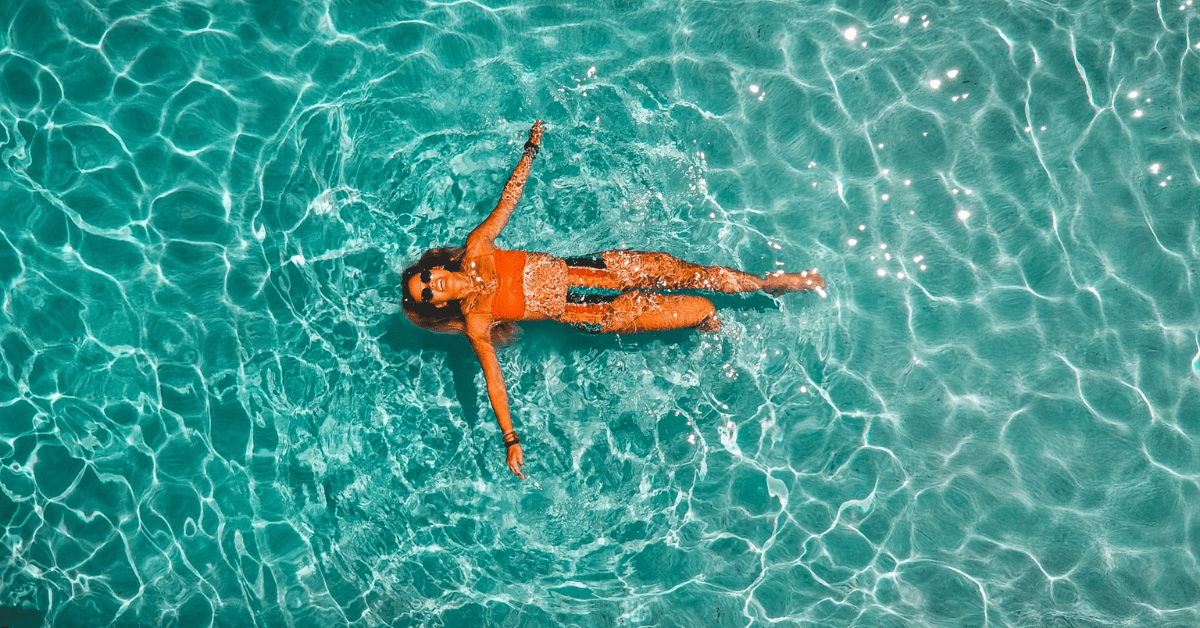Nothing feels as great as leisurely floating around a nice pool on a hot summer day. Everyone knows swimming is great for exercise and stress relief. It is also a fun way to spend the warmer months (or colder months if you have access to an indoor heated pool). However, the magical ingredient that keeps pools sanitized and clean can wreak havoc on your beautiful hair. That’s right, we’re talking about chlorine.
Chlorine in pools is a staple in swimming pool maintenance. The very scent can bring back waves of nostalgia-filled memories of your childhood trips to the pool, swim meets, and quick dips in hotel swimming venues. But can chlorine really turn your hair green? Will it strip the color from color-treated hair? Can it make your hair fall out?
Let’s look at the impact chlorine water can have on your luscious locks and a few ways to protect your hair from it.
How Chlorine Water Damages Hair
Chlorine is a powerful chemical used to kill bacteria, purify drinking water, and even rid farmland of pests. It makes sense that it is not the best thing to expose your hair to for long periods of time without proper aftercare. When a carefully measured amount of chlorine is added to a pool, the chemical “searches” for foreign substances to attach itself to. For example, chlorine bonds with copper and potassium, turning these elements into salts.
And chlorine in pools will find its way to your hair and skin, happily attaching itself to you while pulling moisture from your hair. Turning elements into salt and sucking the moisture from your hair can cause dry, brittle, prone-to-breaking hair. When your hair is robbed of natural oils, split ends can occur from the breakage. It can also make your hair very porous, inviting pollutants and free radicals to enter the hair strands.
What about color-treated hair? The chlorine will happily bond to your hair color and siphon it out of your hair. It does the same with natural hair too! But when you have color-treated hair, chlorine attaches itself to the chemicals in the dye (such as copper). Technically, chlorine water exposure on color-treated hair can cause hair to turn light green. If chlorine doesn’t turn your hair green, it will, at the very least, speed up the fading process.
If you have thin or permed/chemically processed hair, you are also at risk for chlorine damage.
How to Protect Your Hair from Chlorine Water
Chlorine water plus hair equals not the best relationship, but that doesn’t mean you have to avoid the pool or keep your head above water at all costs. You can do numerous things to help protect your hair from chlorine water and minimize the damage chlorine can make on your locks.
Before jumping into the pool, take a moment to rinse off your entire body (hair included). By saturating your hair with clean water, you’ll minimize the porosity of each strand. Therefore, making it harder for chlorine to bond to your hair.
If you are really concerned with the impact chlorine water will have on your hair, or if you have freshly color-treated hair, you may also want to invest in a swim cap. Silicone swim caps are great since they are breathable and are less prone to snagging (and breaking off) your hair.
Love swimming daily in the summer? Lock in your hair’s moisture before you make a splash. Run some coconut, olive, or jojoba oil through your hair. Remember, oil and water don’t mix very well. If you use one of these moisturizing oils before swimming, you’ll be less likely to bear the brunt of chlorine’s damaging effects.
Have lighter locks? You can also use a swim spray, a protective formula beneficial for blonde and light hair. Swim sprays work like nourishing oils, reducing your hair’s porosity while protecting the strands from dehydration and chlorine bonding.
After the Pool
After a swim session, immediately rinse as much chlorine as possible out of your hair with clean water. The longer you let the chemical sit in your hair, the more damage it can do. While plain water will certainly do the trick, especially instead of a comprehensive shower, you may also want to invest in clarifying shampoo and moisturizing conditioner. Choose the product that is right for your hair type. For example, choose a color-treated hair shampoo and conditioner if you have color-treated hair. If you have naturally curly hair, you may want a fortifying shampoo to nourish your curls.
In the summer, you’re probably not just spending time in pools. Since we tend to be outside more during the warmer months, our sun exposure increases. Be sure to apply sunscreen liberally to maintain your skin health. But you also want to protect your hair during the summer. Consider trying a bi-weekly hair mask to lock in moisture and nourish dry strands. When possible, wear hats to protect your scalp from prolonged sun exposure. Above all, hydration is key!
Remember, wet hair tangles easily. So don’t attack your locks with harsh brushing techniques. Take time to gently detangle conditioned hair to avoid breakage.
Elevating Your Hair Health
Let’s say your hair is already suffered significant damage from chlorine water. Don’t fret. Use deep conditioner twice a week to get your hair back to its glowing and healthy state. If you do not have deep conditioner on hand, you can use coconut oil. Simply apply the oil to your hair and scalp and leave it for a few minutes before rinsing off. Follow up with shampoo.
Chlorine rarely leads to severe hair loss, but if you already have thinning hair, chlorine water will not do you any favors. Are you looking to improve hair loss naturally? You may want to consider Platelet-Rich Plasma (PRP) treatment. PRP is a specialized treatment that uses growth factors from your own blood to stimulate hair growth.
Your practitioner will draw blood from your arm and take the sample to a specialized centrifuge. This draws out the platelet-rich plasma that will be used for treatment. After carefully extracting the PRP into a syringe, small injections are made into your scalp. Your PRP penetrates the scalp’s surface and stimulates the regrowth of hair follicles. Over time, the hair will regrow naturally, thanks to the PRP boost. Most patients experience a reduction in shedding after treatment.
You’ll want to elevate your haircare routine to maintain thick, healthy, glowing strands. Shampoo and conditioner are the bare minimum in hair care maintenance. But hyaluronic acid is a game-changer. Known for its plumping and firming properties on the skin, hyaluronic acid can also be used on your hair.
Hyaluronic acid locks moisture and plumps healthy hair strands, making them stronger and less brittle. It can help support collagen development, which is essential for hair health. Hyaluronic acid also revitalizes porous hair! So, if you have chlorine water-damaged hair, you may want to add a few drops of hyaluronic acid onto your clean scalp to seal porous cracks in the hair shaft.
The Bottom Line
If you’re a frequent swimming pool visitor, protect your hair before and after swimming. Too much chlorine exposure can wreak havoc on your beautiful mane, stripping away moisture and color while promoting long-term damage. By following these tips, you can enjoy luminous hair and hot days in the pool without worry.
Curious about haircare treatments or which products are right for you? The knowledgeable team at First Impressions Rejuvenation Clinic is here to help. Simply schedule a consultation, and a compassionate practitioner will discuss your hair goals, needs, and treatment options so that you can love your hair no matter what.
***********************
You eat natural healthy foods. You exercise. You are doing everything right, but stubborn fat is still clinging to your body that you cannot shake off. If you’re seeking a non-invasive remedy to fat loss, then a Coolsculpting® treatment may just be the right fit for you. Learn more when you download our FREE ebook, The #1 Secret about Fat Cells.

